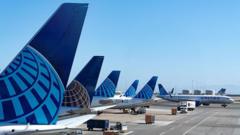Delta Air Lines and United Airlines are facing legal action from frustrated passengers who allege they were unfairly charged for window seats that instead offered views of walls or structural components. The lawsuits, lodged independently against the two major U.S. carriers, aim to secure millions of dollars in compensation for over a million customers who have encountered this issue.
The complaints highlight that neither Delta nor United informs customers that certain “window seats” lack actual windows during the booking process, a critical oversight considering the added costs associated with these selections. Delta has not provided commentary on the lawsuits, while United has declined to address the situation due to its ongoing nature.
Legal representatives from the firm Greenbaum Olbrantz argue that passengers typically opt for window seats for various reasons, including alleviation of anxiety, managing motion sickness, or simply enjoying the view. Without knowledge of the absence of windows, many claim they would not have chosen these seats or paid the additional fees.
The court documents indicate that numerous seats aboard certain Boeing and Airbus models are void of windows due to the placement of essential components like air conditioning ducts or wiring. Despite this, both airlines categorize every seat positioned along the aircraft’s sides as a “window seat.”
The lawsuits describe this practice as misleading and illegal, especially as other carriers, including American Airlines and Alaska Airlines, clearly disclose when a seat does not offer a window view during the booking experience. This issue raises significant concerns over transparency and customer satisfaction in the aviation industry.
The complaints highlight that neither Delta nor United informs customers that certain “window seats” lack actual windows during the booking process, a critical oversight considering the added costs associated with these selections. Delta has not provided commentary on the lawsuits, while United has declined to address the situation due to its ongoing nature.
Legal representatives from the firm Greenbaum Olbrantz argue that passengers typically opt for window seats for various reasons, including alleviation of anxiety, managing motion sickness, or simply enjoying the view. Without knowledge of the absence of windows, many claim they would not have chosen these seats or paid the additional fees.
The court documents indicate that numerous seats aboard certain Boeing and Airbus models are void of windows due to the placement of essential components like air conditioning ducts or wiring. Despite this, both airlines categorize every seat positioned along the aircraft’s sides as a “window seat.”
The lawsuits describe this practice as misleading and illegal, especially as other carriers, including American Airlines and Alaska Airlines, clearly disclose when a seat does not offer a window view during the booking experience. This issue raises significant concerns over transparency and customer satisfaction in the aviation industry.





















